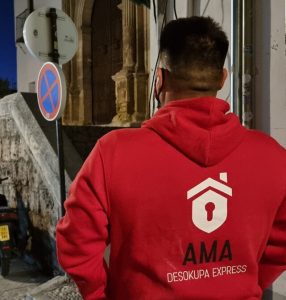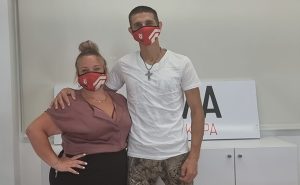“Cases of squatting have
increased tremendously with the pandemic.”
Granada is no stranger to this problem that has been worrying homeowners for months,
AMA Desokupa provides services and assistance to tenants in default and squatters.

The annual report of the Provincial Prosecutor’s Office highlighted the “special problems” that have been detected in Granada in matters such as the illegal occupation of dwellings in the last year. Squatting has become a phenomenon that has hit homeowners and building owners throughout Spain and has increased “a lot” with the Covid-19 pandemic and the economic crisis it has generated. There are several companies working to offer effective eviction services, but a few months ago the first one was launched in Granada, led by a woman. Ángela Mendoza from Granada saw the opportunity to create AMA Desokupa in the midst of the pandemic crisis, a company that offers “100% effective and legal eviction services, either for non-payment of rent or for occupation, but always with social responsibility”. “We count on great professionals to help put an end to this illegal movement that is plaguing more and more families and property owners,” assures Mendoza.
AMA Desokupa’s procedures for assisting owners affected by illegal occupation have a “prior analysis” that is in line with the policy of “social responsibility”. “When I did the first eviction, after trying to sleep, I thought that I could not work like that and, from then on, we implemented a new socially conscious policy in the company. It is important to study both sides. From there, as each eviction has different precarious tenants or ‘squatters’, we study the real needs of each one and provide them with social opportunities for their social inclusion,” he says.

“Evicting a squatter commune is not the same as evicting a family with minors and what we do is to study the case and, depending on the needs, we rely on our social partners, who are sometimes public and sometimes private entities,” explains Mendoza. Financial aid, support in finding a job, social housing or food delivery are some of the assistance that the entities that collaborate with AMA Desokupa can offer to those affected, both tenants and squatters.
There are several experiences of social inclusion that this company from Granada has developed, but there is one that “touched the heart” of Mendoza. “It was a boy we brought from Toledo after evicting him for non-payment of rent. The boy would be left on the street and without a job and I, without thinking about it, as in Granada I have a better hand, I brought him. Here we looked for a temporary place for him, at the Granja Escuela Parapanda, in Íllora. There he was given lodging and temporary work. He stayed for about 15 days and then we found him a house where he could live continuously and a full-time job in a meat company. This was all through a collaborative entity called Asociación Familias Solidarias, which has a branch in Granada, another in Seville and another in Murcia,” he explains.

Ángela Mendoza with Mostafa Veysi, the boy she helped with social reintegration after an eviction for non-payment in Toledo.
In addition to Granada, AMA Desokupa has also handled cases of squatting and evictions for non-payment of rent in other cities such as Toledo, Ciudad Real, Murcia, Seville and Huelva. “The cases have increased a lot with occupation and non-payment of rents nationally and globally. The situation we are experiencing with the pandemic is something that affects all of us”, says Mendoza, who points out that she has not encountered “problems as such, but barriers” in her work in a field of activity labeled in the male world. “But nothing that a good pair of heels can’t fix,” she adds with a smile.
Eviction procedures are not “systematic by definition, because each case is different, has different needs and medication always plays a fundamental role,” says Mendoza. If it is a case of ‘squatters’, who have taken over an uninhabited house or premises and have moved into it without the consent of the owner, the eviction may take place “between 24 and 72 hours” from the signing of the contract and if it is a case of non-payment of rent, in which action is taken through negotiation, it may take “between seven and 25 days” to take place. “The main objective is for the owner to get his house back, because it is his,” Mendoza emphasizes.

